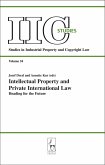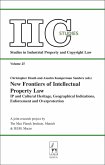Intellectual property rights, conventionally seen as quite distinct, are increasingly overlapping with one another. There are several reasons for this: the expansion of IPRs beyond their traditional borders, the creation of new IPRs especially at EU level, the exploitation of gaps in the law by shrewd lawyers, and the use of unfair competition as an alternative when IPRs are either not available at all or expired. The convergence of several IPRs on the same subject-matter poses problems. As they are normally envisaged as water-tight categories, there are very few rules which cater for the sort of regime clash that any overlap of IPRs necessarily entails. This book's aim is to find appropriate rules to regulate overlaps and thereby avoid regime conflicts and undue unstructured expansion of IPRs. The book studies the practical consequences of each overlap at the international, European and national levels (where the laws of France, the UK and Germany are reviewed). It then analyses the reasons for the prohibition or authorisation of overlaps. This analysis enables the determination of criteria and principles that can be used to (re)map the overlaps to achieve appropriateness and legitimacy.
Bitte wählen Sie Ihr Anliegen aus.
Rechnungen
Retourenschein anfordern
Bestellstatus
Storno









